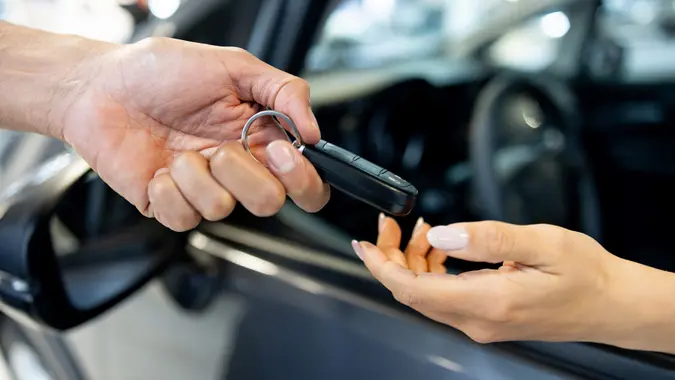5 Money Moves To Make Now If You Want To Buy a Car in 2026

Commitment to Our Readers
GOBankingRates' editorial team is committed to bringing you unbiased reviews and information. We use data-driven methodologies to evaluate financial products and services - our reviews and ratings are not influenced by advertisers. You can read more about our editorial guidelines and our products and services review methodology.

20 Years
Helping You Live Richer

Reviewed
by Experts

Trusted by
Millions of Readers
Buying a car is an expensive undertaking. In September 2025, Kelley Blue Book (KBB) reported the average purchase price of a new car was $50,080. And the average price of a used car was listed at $25,512, also according to KBB.
With high price points and tight budgets, a little bit of preparation can go a long way toward preparing your finances for a car purchase in 2026. Here’s a look at the money moves you should make now if you want to buy a car in 2026.
Set a Budget
Take a look at your personal finances to determine what you can realistically afford to pay for a car. While it’s tempting to only look at the monthly payment, it’s important to factor in all car-related costs. Things like gas, tolls, maintenance and insurance can really add up. Make sure you have room in your budget for everything before committing to a vehicle you can’t truly afford.
If you have enough to pay for a used car in cash, that might be the best option. You’ll eliminate interest charges and won’t drive off the lot with a new monthly payment in tow.
Research
Before you jump into a major purchase of any kind, including a vehicle, it’s critical to do some research. Take the time to explore your vehicle options and determine which might best suit your lifestyle and your budget. For example, you might want a family-sized SUV or a smaller sedan. Consider your options across multiple vehicle makes and models to hone in on the one that best suits your needs.
Beyond the vehicle, start looking into which dealerships have the best options and reviews. If possible, you’ll want to work with a highly-rated car dealership or a trusted seller.
Work on Your Credit Score
Many car purchases are made with some sort of financing. In fact, the Federal Reserve recently reported that 80% of new car purchases and 38% of used vehicle sales were financed through a loan or lease. If you’ll be leaning on financing to purchase your next ride, a good credit score will likely come in handy.
Typically, borrowers with a higher credit score can tap into lower interest rates and better terms, which could translate into thousands saved in interest charges. With that, it’s a good idea to spend some time beefing up your credit score.
Start by committing to on-time payments to all debt. As you build a history of on-time payments, your credit score may rise over time.
Start Saving
With your budget in mind, it’s time to start saving. Whether you are aiming to accumulate a down payment or the entire purchase price, automatically setting aside a portion of your paycheck each month for this savings goal can pay off.
If possible, tuck your savings into a high-yield savings account (HYSA). The interest you earn through an HYSA can help you make progress toward your savings goal.
Shop Around for Cars and Financing
When the time comes to move forward with your car purchase, make the effort to shop around for both vehicles and financing. Car dealerships are notorious for attaching high interest rates to their loans. But if you shop around to find a loan through another lender, like a bank or credit union, you could find significant savings.
Start exploring which lenders offer the most affordable rates in your area. If a local credit union offers a particularly attractive interest rate, it might be worth joining this year to streamline an affordable financing option next year.
 Written by
Written by  Edited by
Edited by 

























